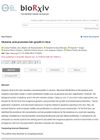TLDR Polyglutamic acid is a valuable, sustainable ingredient for skincare and haircare products.
Polyglutamic acid (PGA) is a versatile biopolymer with significant potential in the cosmetic industry due to its biocompatibility, water solubility, and film-forming properties. It is used in skincare and haircare products for its moisturizing, anti-aging, depigmentation, and sun protection benefits. PGA enhances skin hydration, elasticity, and collagen production, reduces hyperpigmentation, and forms protective barriers. In haircare, it shows promise in treating alopecia by inhibiting the 5-alpha reductase enzyme and promoting hair growth. PGA's biocompatibility and biodegradability also make it suitable for wound healing applications. Future research should focus on optimizing production processes and exploring new microbial strains to enhance PGA yields, ensuring the development of effective and eco-conscious cosmetic products.
 September 2020 in “bioRxiv (Cold Spring Harbor Laboratory)”
September 2020 in “bioRxiv (Cold Spring Harbor Laboratory)” Glutamic acid helps mice grow hair.
 22 citations
,
October 2019 in “International Journal of Nanomedicine”
22 citations
,
October 2019 in “International Journal of Nanomedicine” The nanoparticles improved hair growth and enlarged hair bulbs.
 9 citations
,
March 2015 in “Journal of Microbiology and Biotechnology”
9 citations
,
March 2015 in “Journal of Microbiology and Biotechnology” Ultra-high molecular weight poly-γ-glutamic acid may help promote hair growth.
 32 citations
,
December 2013 in “Biological & Pharmaceutical Bulletin”
32 citations
,
December 2013 in “Biological & Pharmaceutical Bulletin” Rice bran extract can potentially treat hair loss by promoting hair growth and increasing the number of hair follicles.
October 2025 in “Bioactive Materials” Combining traditional Chinese medicine with microneedles shows promise for effectively treating skin diseases with fewer side effects.

Nanocarriers with plant extracts show promise for safe and effective hair growth treatment.
 5 citations
,
January 2017 in “Elsevier eBooks”
5 citations
,
January 2017 in “Elsevier eBooks” The document concludes that cosmetics need biocompatible, eco-friendly ingredients due to aging populations and demand for effective products.
 July 2024 in “Current Pharmaceutical Design”
July 2024 in “Current Pharmaceutical Design” Biodegradable polymers help wounds heal faster.
 February 2026 in “Archives of Dermatological Research”
February 2026 in “Archives of Dermatological Research” Microneedle-delivered polyglutamate effectively and safely improves hair growth in androgenetic alopecia.







